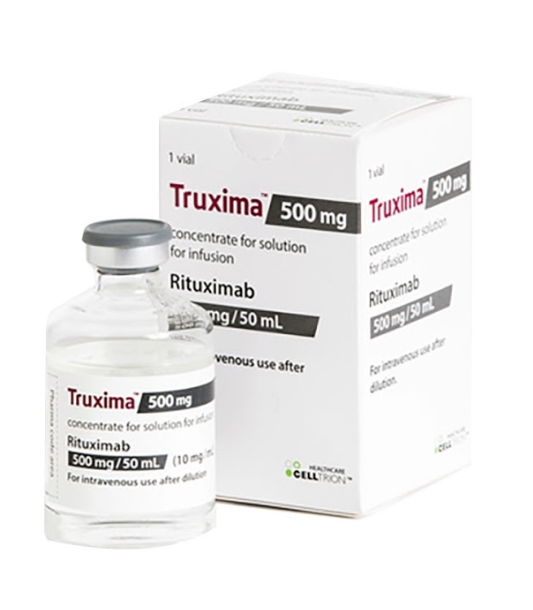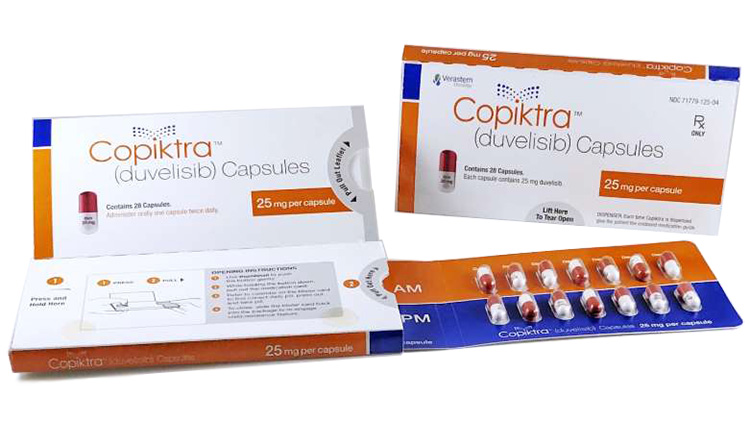Truxima (rituximab) vs Copiktra (duvelisib)
Truxima (rituximab) vs Copiktra (duvelisib)
Truxima (rituximab) and Copiktra (duvelisib) are both used to treat certain types of blood cancers, but they work in different ways. Truxima is a monoclonal antibody that targets the CD20 protein found on the surface of B-cells, leading to the destruction of these cells, and is often used in conditions like non-Hodgkin lymphoma and chronic lymphocytic leukemia. Copiktra, on the other hand, is a small molecule inhibitor that targets PI3K-delta and gamma, disrupting cancer cell growth and survival, and is indicated for relapsed or refractory chronic lymphocytic leukemia/small lymphocytic lymphoma and follicular lymphoma. The choice between these medications would depend on the specific type of cancer, its stage, previous treatments, and the patient's overall health and treatment goals, which should be discussed with a healthcare provider.
Difference between Truxima and Copiktra
| Metric | Truxima (rituximab) | Copiktra (duvelisib) |
|---|---|---|
| Generic name | Rituximab | Duvelisib |
| Indications | Non-Hodgkin's lymphoma, chronic lymphocytic leukemia, rheumatoid arthritis, granulomatosis with polyangiitis, microscopic polyangiitis | Chronic lymphocytic leukemia, small lymphocytic lymphoma, follicular lymphoma |
| Mechanism of action | CD20-directed cytolytic antibody | PI3K inhibitor, targeting delta and gamma isoforms |
| Brand names | Truxima, Rituxan, MabThera | Copiktra |
| Administrative route | Intravenous infusion | Oral |
| Side effects | Infusion reactions, infections, cytopenias, hypogammaglobulinemia, mucocutaneous reactions | Diarrhea, neutropenia, rash, fatigue, pyrexia, cough, anemia, nausea, upper respiratory infection |
| Contraindications | Known severe, life-threatening infusion reactions to rituximab; severe active infections | History of severe allergic reactions to duvelisib; active, serious infections |
| Drug class | Monoclonal antibody | Small molecule kinase inhibitor |
| Manufacturer | Celltrion Healthcare, Genentech (Roche) | Verastem Oncology |
Efficacy
Truxima (Rituximab) Efficacy in Lymphoma
Truxima, a biosimilar to the original rituximab, is a monoclonal antibody that targets the CD20 antigen on the surface of pre-B and mature B lymphocytes. It is used in the treatment of non-Hodgkin lymphoma (NHL) and is effective in both newly diagnosed and relapsed or refractory cases. Clinical trials have demonstrated that rituximab, when combined with chemotherapy, improves overall survival and response rates in patients with various subtypes of NHL, including diffuse large B-cell lymphoma (DLBCL) and follicular lymphoma. The addition of rituximab to standard chemotherapy regimens is now considered a standard of care in the treatment of these lymphomas.
In chronic lymphocytic leukemia (CLL), which is a type of lymphoma, rituximab has also shown efficacy. When used in combination with chemotherapy, rituximab has been found to increase the time to disease progression and overall survival in patients with CLL. The use of rituximab in other forms of lymphoma, such as mantle cell lymphoma (MCL), has also been explored, with positive outcomes in terms of response rates and progression-free survival when used as part of combination therapy.
Copiktra (Duvelisib) Efficacy in Lymphoma
Copiktra, known generically as duvelisib, is an oral inhibitor of phosphoinositide 3-kinase (PI3K), and it is used in the treatment of certain types of lymphoma. It has been approved for the treatment of adult patients with relapsed or refractory chronic lymphocytic leukemia/small lymphocytic lymphoma (CLL/SLL) after at least two prior therapies. Duvelisib has shown efficacy in inducing responses in a significant proportion of these patients. The drug has also been approved for the treatment of relapsed or refractory follicular lymphoma after at least two prior systemic therapies.
Clinical trials have demonstrated that duvelisib improves the median progression-free survival in patients with relapsed or refractory CLL/SLL when compared to the standard of care. In follicular lymphoma, duvelisib has been shown to achieve a response rate in a subset of patients who have exhausted other treatment options. However, the use of duvelisib is associated with a risk of serious adverse events, which necessitates careful patient selection and monitoring during treatment.
Regulatory Agency Approvals
Truxima
-
European Medical Agency (EMA), European Union

-
Food and Drug Administration (FDA), USA

-
Health Canada

-
Therapeutic Goods Administration (TGA), Australia

-
Medsafe (NZ)

Copiktra
-
European Medical Agency (EMA), European Union

-
Food and Drug Administration (FDA), USA

Access Truxima or Copiktra today
If Truxima or Copiktra are not approved or available in your country (e.g. due to supply issues), you can access them via Everyone.org.
How it works

Make an enquiry
Choose the medicine you want to buy, answer a couple of questions, and upload your prescription to speed things up. We’ll get back to you within 24 hours.


Make an enquiry
Choose the medicine you want to buy, answer a couple of questions, and upload your prescription to speed things up. We’ll get back to you within 24 hours.


Breeze through the paperwork
We'll guide you through the required documents for importing unapproved medicine, ensuring you have all the necessary information.


Get a personalized quote
We’ll prepare a quote for you, including medicine costs and any shipping, administrative, or import fees that may apply.


Receive your medicine
Accept the quote and we’ll handle the rest - sourcing and safely delivering your medicine.

Some text on this page has been automatically generated. Speak to your physician before you start a new treatment or medication.
Let's talk
If you have any questions, call us or send us a message through WhatsApp or email:
Contact us




